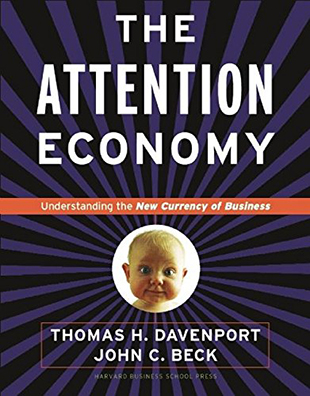"Understanding and managing attention is now the single most important determinant of business success," write Thomas H. Davenport, Director of the Accenture Institute for Strategic Change, and John C. Beck, a Senior Research Fellow at the same firm. We live in an information saturated environment and are constantly inundated with e-mails and voice mails. Many white-collar workers complain of “info-stress.” The authors quote an Institute for the Future study describing a 200 message per day communications environment; 71 % of white-collar workers said they felt stressed by the amount of information they received each day, and 60 % felt overwhelmed.
Davenport and Beck are convinced that if you want to be successful in the current economy, you've got to be good at getting attention. This means that everyone in a business has to become an information provider, trying to get the attention of others to our e-mails, memos, projects, and proposals. The authors believe that in the future individuals will be advanced not on the basis of time logged or output generated but on the usefulness of their ideas. One of the best ways to get a customer’s attention is to customize things for them. Research has proven that narcissism is a key factor in what we pay attention to.
Whether exploring the stickiness of Internet sites or the sweet spot of attention given to movies, Davenport and Beck do a smashing job exploring the attention industries (print media, cable, home video, Hollywood movies, music, and advertising). For example, we have always been awed by the experience of sitting in a crowded movie theatre and looking at the sea of heads all turned to the screen. Part of the marvel in this is that all the people there are united in an experience of attentiveness. Everything has been done to focus our eyes on the screen and to block out the rest of the world.
Like a cell phone call during a movie, behaviors that unfairly consume the attention of others are considered rude. Davenport and Beck point out that the most important function of attention isn’t taking information in, but screening it out. In the future, people will be turning to attention-protecting devices designed to tune out distracting messages and bothersome intrusions such as phone company pitches or email spam.
As Herbert Simon has wisely remarked: "What information consumes is rather obvious; it consumes the attention of its recipients. Hence, a wealth of information creates a poverty of attention." This has already happened in the corporate world where managers and other knowledge workers are suffering from attention deficit disorders.
